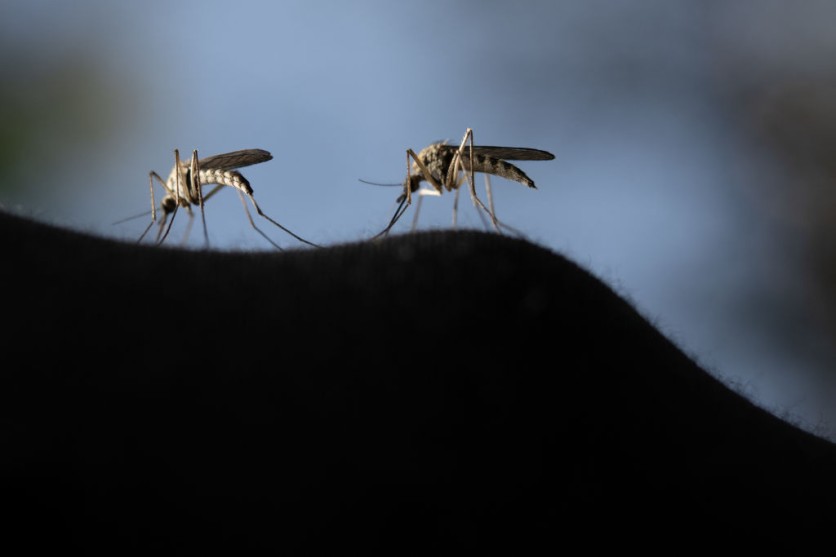Experts are reportedly warning that mosquito-borne diseases can now migrate and cause outbreaks in more countries where they would not have been able to occur previously, thanks to global warming.
By the turn of the century, scientists warned that diseases like dengue and malaria spread by mosquitoes might affect over half of the world's population.
According to data issued by the UK Health Security Agency (UKHSA), the number of imported malaria cases in the UK exceeded 2,000 last year for the first time in more than twenty years.

(Photo: OLIVIER MORIN/AFP via Getty Images) This photograph shows Mosquitoes trying to sting through a glove in a deep forest near Sundom, western Finland, on June 18, 2023.
According to the report, after traveling overseas, 2,004 instances of malaria were confirmed in England, Wales, and Northern Ireland in 2023, as opposed to 1,369 in 2022.
As per the UKHSA, the increase can be attributed to the recurrence of malaria in numerous countries and the growth in international travel after the removal of pandemic restrictions.
In the meantime, the World Health Organization has received reports of dengue illnesses from over five million people worldwide in 2019, an eight-fold rise in the past 20 years from 500,000 cases in 2000.
Since 2000, dengue-carrying mosquitoes have expanded to 13 European nations; in 2023, localized cases of the disease were reported in Italy, France, and Spain.
Read Also: Honduras Innovates in Dengue Epidemic Fight by Deploying Special Mosquitoes
Global Warming as a Cause
According to the experts, dengue was mostly limited to tropical and subtropical areas until recently because the mosquito's larvae and eggs are killed by freezing temperatures.
Professor Rachel Lowe of the Catalan Institution for Research and Advanced Studies in Spain explained that as a result of climate change-induced global warming, disease vectors that transmit dengue and malaria can now live in more areas, leading to outbreaks in areas where the population is more likely to lack immunity and where public health systems are less equipped.
According to the researchers, if global warming is kept to 1C, there could be 2.4 billion more individuals at risk of dengue and malaria by 2100 compared to 1970-1999.
However, they estimate that by the end of the century, 4.7 billion people might be afflicted by dengue and malaria if current rates of greenhouse gas, carbon emissions, and population increase continue.
Professor Lowe's remarks are in line with a Stanford article from 2023 that claimed that mosquito-borne illnesses are changing significantly due to climate change. Variations in precipitation, increased temperatures, and human activities are facilitating their dispersal to previously unprepared areas.
Global Mosquito-Borne Disease Cases
Last year, after disastrous outbreaks that stretched from Bangladesh to Peru and an unprecedented number of cases in Europe, World Health Organization officials warned that dengue incidence could almost reach all-time highs due to climate change.
Public health professionals are nonetheless concerned about mosquito-borne illnesses since earlier reports have shown that the US and other countries are not doing enough to combat the growing threat posed by disease-carrying mosquitoes as a result of globalization and climate change.
Related Article: New Drone System Fights Spread of Diseases By Releasing Mosquitos

(Photo: Tech Times)

![Apple Watch Series 10 [GPS 42mm]](https://d.techtimes.com/en/full/453899/apple-watch-series-10-gps-42mm.jpg?w=184&h=103&f=9fb3c2ea2db928c663d1d2eadbcb3e52)


